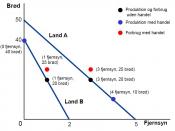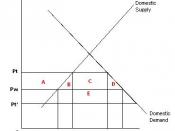Abstract
This assignment consists of using a simulation from the week 5 eResource pertaining to international trade - advantages and limitations of international trade the country of Rodamia. The simulation provides some reasons for international trade, while it is my responsibility to determine which countries to trade with and what products to import and export. I will also determine when to impose trade restrictions like tariffs and quotas and when to negotiate trade agreements.
Fiscal Policy Simulation
Rodamia is a large country in terms of area, population and level of economic development in comparison to its neighbors. Four percent of the country's GDP comes from agriculture; mainly corn, wheat, cotton and dairy and poultry products. Thirty percent comes from industry and 66% from services.
There are three bordering countries: Uthania, Alfazia and Suntize. Uthania has rich mineral and coal deposits and a strong industrial sector makes up 40% of the GDP.
Agriculture: corn, soybeans, coffee, cocoa, and dairy and poultry products make up 12% and the remaining 48% comes from services. Alfazia's agriculture makes up 39% of their GDP, 20% from industry and 41% from services. Suntize is a popular tourist destination; 50% of the GDP comes from services, 42% from industry and 3% from agriculture.
Scenario 1: Looking Outward - "Opening Rodamia's borders to international trade and investment will lead to greater benefits for the country", quoted by President Jacobs. Decisions need to be made as to which countries to trade with, which commodities to encourage for domestic production and exports and which commodities to import.
Decisions:
Exports Imports Trade Partner
Cheese Corn Uthania
DVD Players Watches Suntize
The decisions above are in line with the opportunity costs of production of these products in their respective countries. Rodamia does not have an absolute advantage in either cheese or corn,



Good Content
Even without having done the simulation, I was able to visualize it.
2 out of 2 people found this comment useful.